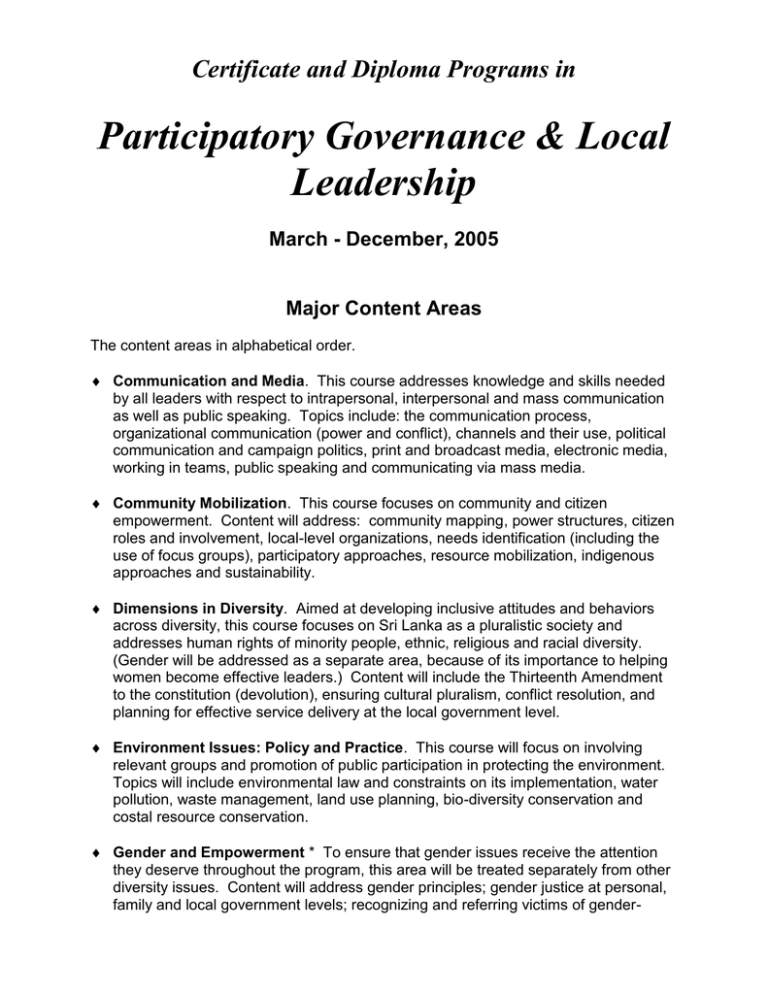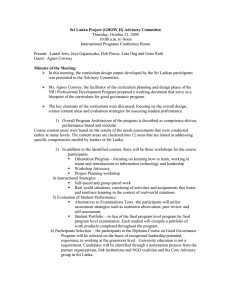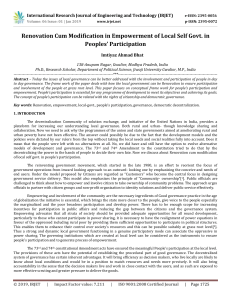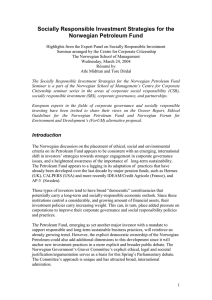Content Areas in brief
advertisement

Certificate and Diploma Programs in Participatory Governance & Local Leadership March - December, 2005 Major Content Areas The content areas in alphabetical order. Communication and Media. This course addresses knowledge and skills needed by all leaders with respect to intrapersonal, interpersonal and mass communication as well as public speaking. Topics include: the communication process, organizational communication (power and conflict), channels and their use, political communication and campaign politics, print and broadcast media, electronic media, working in teams, public speaking and communicating via mass media. Community Mobilization. This course focuses on community and citizen empowerment. Content will address: community mapping, power structures, citizen roles and involvement, local-level organizations, needs identification (including the use of focus groups), participatory approaches, resource mobilization, indigenous approaches and sustainability. Dimensions in Diversity. Aimed at developing inclusive attitudes and behaviors across diversity, this course focuses on Sri Lanka as a pluralistic society and addresses human rights of minority people, ethnic, religious and racial diversity. (Gender will be addressed as a separate area, because of its importance to helping women become effective leaders.) Content will include the Thirteenth Amendment to the constitution (devolution), ensuring cultural pluralism, conflict resolution, and planning for effective service delivery at the local government level. Environment Issues: Policy and Practice. This course will focus on involving relevant groups and promotion of public participation in protecting the environment. Topics will include environmental law and constraints on its implementation, water pollution, waste management, land use planning, bio-diversity conservation and costal resource conservation. Gender and Empowerment * To ensure that gender issues receive the attention they deserve throughout the program, this area will be treated separately from other diversity issues. Content will address gender principles; gender justice at personal, family and local government levels; recognizing and referring victims of gender- based violence; and lobbying, advocacy, networking and mobilization for gender justice. Good Governance and Civil Society The course will focus on meeting the challenges of good governance in the Sri Lankan context. Topics include institutions, principles and practices of good governance; the role of non-state actors; pillars of good governance; accountability and transparency; corruption as a challenge; participation (responsiveness, consensus orientation, advocacy, lobbying); qualities of life (ethics, value systems, standards), rights and responsibilities of citizens; and media freedom. Effective Leadership in a Democracy. Topics will include characteristics needed for effective leadership; motivating, persuading and empowering groups to take action (for community improvement, civil society improvement, against corruption); fostering win-win environments, managing meetings effectively, techniques for democratic decision-making. Major part of this course will be conducted in a workshop format at the beginning stage of the course. Management Skill for Building Civil Society. Based on management principles and practices, participants will build skills in: effective problem-solving methods; managing conflicts constructively; conducting SWOT analyses (strengths, weaknesses, opportunities, threats); evaluation methods; and personal time management. The course will focus on using these skills within team environments and the effective use of the team’s human resources. (This course will NOT address quality management or human resource development/management in organizations. It will focus on management skills used outside formal institutions, when developing and managing empowered groups at the grassroots level needed for building a civil society. Policy Development: Principles and Practices: This area will be addressed in Phase II of the program, leading to the Diploma. It requires a thorough grounding in good governance and other topics being addressed in the certificate phase. Topics will include: the policy cycle (formulation, alternative generation, evaluation and selection); policy analysis tools (stakeholder analysis, cost/benefit analysis); interest group involvement; evaluation of past poverty alleviation policies. Project Development for Community Empowerment. Participants will actually plan and manage a community project as their key assignment. Content will address project planning, management and evaluation. Topics will include situation analysis; needs assessment at the community level; needs identification techniques (PRA, RRA); assessing project feasibility; setting goals and objectives; preparation of action plans, project budget and appraisal techniques; project implementation issues; project coordination, monitoring, and evaluation. (Major part of this course will be conducted in a workshop format.) This course will be revised to be linked to the situation arose from the Tsunami disaster. Technology in Learning. (This module will be included in the latter part of the Course- second five months, only if the budget permits). This content will focus on building skills in using computer programs for word processing; creating presentations; and communicating via email, internet chat sessions, and websites. It will also include how to use the internet to locate (and evaluate) information to support decision-making.




